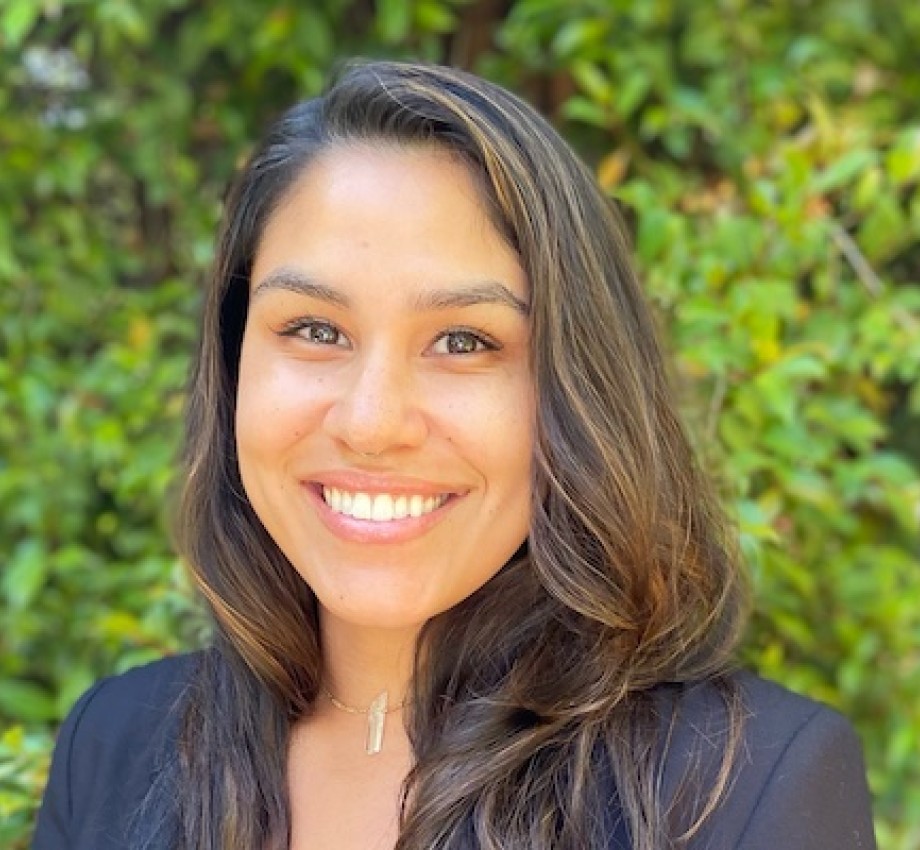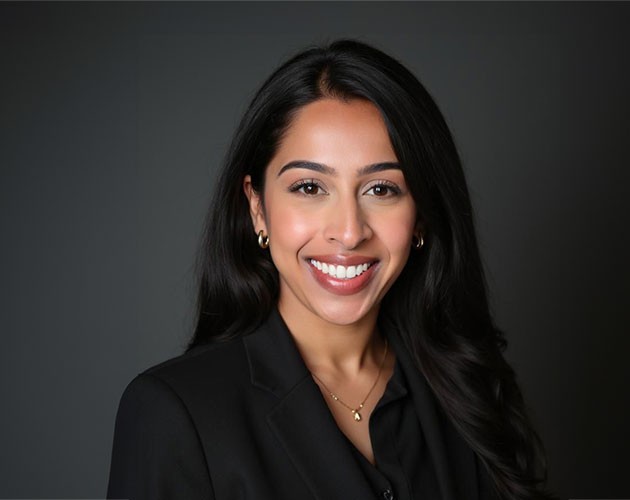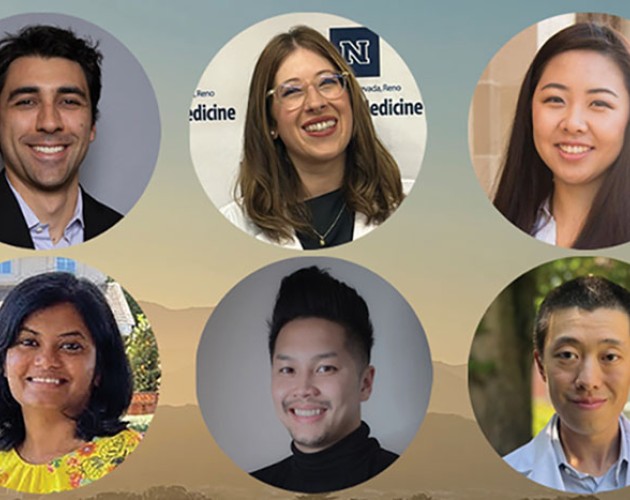The Hierarchy of Meeting Needs

In a way, Jessica Raya’s personal background has been built on Abraham Maslow’s Hierarchy of Needs concept. Born in Sacramento, Calif., Jessica eventually moved with her family to the Central Valley and then to San Diego, as her father found work to provide food, shelter, safety and wellness for the one-income family.
Those four items are the foundation of the pyramid: securing basic needs.
While in high school in San Diego, Jessica took an AP psychology course where she learned about Maslow’s pyramid. This sparked her interest to study psychology, eventually earning a bachelor’s from UC San Diego (UCSD) in 2017 with a major in psychology with a human-health specialization.
“I wasn’t 100-percent sure I wanted to go to medical school until my third year of college,” says Jessica. “By then, I was almost done with my degree, so I finished my courses but knew I would eventually go back to school to finish my medical school prerequisites.”
Helping Homeless People Fulfill Their Needs
The idea of fulfilling Maslow’s Hierarchy of Needs for others is woven throughout Jessica’s journey—and it started during her undergraduate studies.
“In 2015, I went on a two-week medical outreach trip to Cusco, Peru, as a volunteer through VAW Global Health Alliances (Volunteers Around the World),” she explains. “We spent the school year preparing for the free clinics we would set up in the rural communities in the Andes mountains. It was my first exposure to communities who didn’t have regular access to health care or medicine. I felt so much compassion for each patient who we were able to connect with services, and began thinking about how I could continue helping communities like this one access medical care.
“From 2016 to 2017, I began volunteering in a student-run free clinic in Tijuana,” she continues. “We saw many Haitian refugees come into our clinic who had walked all the way from Central America. At the time, Tijuana didn’t have the capacity to house and support all these people, and we often offered medical care to homeless refugees.
“I was usually stationed at patient registration and listened to a lot of these patients’ stories. I couldn’t help feeling like I wanted to help more, like many in that role do. I wanted to continue working in community health and address health inequities.”
So after graduation, Jessica moved to the San Francisco Bay Area to be closer to relatives who lived here. She found work as a case manager with San Francisco’s Homeless Outreach Team, which places the city’s large homeless population into shelter and housing or connects them with other available resources.
“The city is the opposite of the rural, remote communities I’ve volunteered in, yet has almost 7,000 underserved people,” Jessica says.
During her two years as a case manager, Jessica managed a caseload of up to 20 clients, providing chronically homeless adults primary medical and psychiatric care and social services; designing treatment plans for each client based on medical acuity, substance use disorders and mental health disorders; and addressing food, shelter and clothing insecurity.
“While I was a case manager, I kept thinking how badly I wanted to serve the population in a physician’s capacity,” she says. “I felt like I could only offer so many services as a case manager and envisioned myself offering medical care in encampments.”
It became obvious to her, as she considered client treatment plans, that the “health and wellness” level needed to be met concurrently with the “food and shelter” foundation for these clients. And in order for her to help in the most effective way, Jessica’s goal to attend medical school could no longer be put off.
Meeting Her Own Needs
In 2019, Jessica started as a medic at the Berkeley Free Clinic, and soon after applied to our Post-Baccalaureate Health Professions Program in order to complete medical school prerequisites and raise her GPA.
The San Francisco Bay Area is an expensive place to live in—and Jessica felt the financial pinch: She was “one paycheck away from being homeless” herself.
In addition to being a student, Jessica continued her medic role at the Berkeley Free Clinic, while adding on a research assistant position for the San Francisco VA Medical Center and one as a clinical research coordinator at University of California, San Francisco.
“My housing instability has caused so much emotional disruption and housing-related stress in my life that it’s often left me wondering how I could possibly focus on studying or attain the much needed ‘A’ for medical school,” Jessica reflects. “However, through my efforts, I’ve come to find that financial hardships are a limitation but not a barrier to success.”
“The post-bacc health program has been the perfect option for me because I hope to stay in the Bay Area and continue serving the communities here.”
And her successes have paid off. Jessica is almost ready to finish our program and apply to medical schools.
She partially credits her success so far to instructor Michael Kelleher, Ph.D., whose fun teaching style made the chemistry concepts understandable.
“‘Dr. K’ is the best,” Jessica praises. “He was my instructor for both General Chemistry 1 and Organic Chemistry 1.
“I thought organic chemistry would forever be the bane of my existence, but Dr. K simplified concepts down and went in depth to explain the whys. I had learned these concepts before, but they had seemed so vague. Dr. K made them understandable by explaining the background and reasoning behind each concept. And he did all this while making it fun! He has a great sense of humor and makes students smile or laugh at least once during every single class.”
Our instructors continued to impress Jessica even after her courses switched from in person to Live Online. “Every instructor I’ve had at Extension has risen up to the challenge and found ways to engage students more—through breakout rooms, mini quizzes at the beginning of class and writing things out on paper or a whiteboard, or by making the content more engaging instead of just PowerPoint slides.”
That engagement carried over to her interactions with classmates, too.
“We made a GroupMe for every class, and students communicate regularly on there. It really helps—especially when a big midterm is coming up and we can check in with each other to see how everyone’s doing or support other students who are struggling with a certain topic. It’s a good feeling to know that I’m not alone in these classes and that I can turn to GroupMe just to talk to other students. Many of us are on the path to graduate school, and we were able to connect more on the messaging platform and talk about our journeys. The sense of community has gotten me through this past year.”
Because of the camaraderie of her peers and the support of her instructors, Jessica’s medical school goal is coming into view.
“I’ve learned to stay determined,” she reflects. “The medical school application process has been such a long one—it’s easy to burn out—but going to medical school is something I’ve wanted and worked toward for years. The two years I took off after undergrad were invaluable and solidified my reasons for pursuing medical school.
“And the past two years at UC Berkeley Extension have helped me become a much better student and given me the basics—and more—that I will definitely need to succeed in medical school.”
Jessica earned part of that “and more” by applying for one of our Community Impact scholarships last year.
“The post-bacc health program has been the perfect option for me because I hope to stay in the Bay Area and continue serving the communities here. And the scholarship has allowed me to continue my career path toward being a physician,” says Jessica.
“Working part- and full time during school, studying for the MCAT and completing the medical school application process have been so challenging—I’m beyond grateful for the scholarship because it’s given me some room to breathe. Normally all of my free time is spent working, but with the scholarship, I could be more selective with my free time and instead devote some extra hours to the Berkeley Free Clinic or study more for biochemistry so I can raise my GPA and be a more competitive med school applicant.”
And she will be looking at the top of the pyramid of needs as a primary care physician in the future.
“I’m applying to medical school this year for the 2021–2022 cycle,” Jessica says. “I envision myself going into family medicine. After volunteering in rural communities, and even as a case manager in San Francisco, I felt there was a big lack of primary care. I think family medicine is so valuable and applicable to all patients.
“My first medical outreach trip showed me how far their broad scope of medical knowledge can go. Community health is what drew me to medicine, and family medicine would be a great foundation for me to serve communities who don’t have any access to medical care.”
With a bright future ahead, Jessica wants to combine the skills she gained in the health professions program with the empathy that her family instilled in her, and make sure everyone’s physiological and holistic health needs are met.
Find out if a career in the health professions is right for you.


